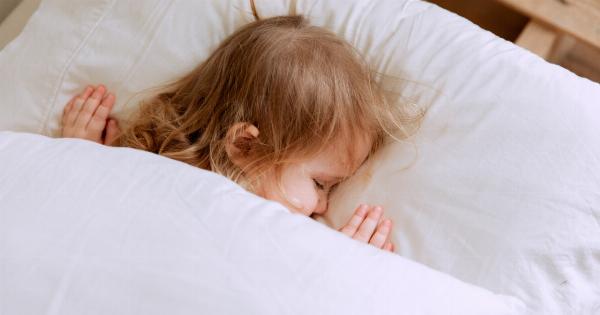Being a parent is one of the most rewarding experiences in life. However, it can also be quite challenging, especially when it comes to getting your little ones to sleep.
Sleepless nights can take a toll on any parent, and it’s essential to find ways to get your children into a regular sleep routine. Here are some tips that can help you get a good night’s sleep:.
Establish a Consistent Sleep Routine
Establishing a consistent sleep routine is one of the best ways to help your child get into a healthy pattern. It’s important to have a fixed time for your child to go to bed and wake up every day.
You can follow a set of activities like bath, story reading, or singing a lullaby every night before going to bed. As a result, the child will associate these activities with sleeping and eventually start feeling sleepy. The consistency helps the child’s internal clock and makes it easier to fall asleep at night hoping to encourage a good sleep pattern.
Create a Relaxing Environment
A child’s bedroom environment can have a significant effect on their quality of sleep. A calm and relaxing environment can help reduce any stress or anxiety a child may have.
Soft lighting, a comfortable mattress, a calm temperature, and soothing music can all play a vital role in creating a relaxing environment. It’s also important to make sure the bedroom is free of noise and distractions to aid in the sleep process.
Avoid Screen Time Before Bedtime
Studies show that exposure to electronic devices before bedtime can interfere with sleep patterns. The blue light emitted by electronic devices can suppress melatonin (the sleep-inducing hormone) and disrupt circadian rhythms.
Therefore, it’s advisable to put all devices, including smartphones, tablets, or laptops, down at least an hour before bedtime and encourage your child to read books or listen to calming music before sleeping.
Encourage Physical Activity
Physical activity during the day can make it easier for your child to fall asleep at night. Encouraging an active lifestyle, like playing outdoors or taking part in sports, can improve sleep patterns and decrease restlessness.
However, make sure the activities don’t interfere with bedtime and consider activities such as yoga, which can help the child relax and wind down before bed.
Create a Comfortable Sleeping Environment
Creating a comfortable sleeping environment is vital to make sure your child gets a good night’s sleep. This can be done with a comfortable mattress, pillows that provide adequate support, and appropriate blankets.
Temperature control is also important, as being too hot or too cold can disrupt sleep.
Monitor Caffeine and Sugar Intake
Consuming caffeine and sugary foods can affect your child’s sleep quality. It’s advisable to avoid these foods before bedtime or limit their intake during the day.
High caffeine intake can increase restlessness, anxiety, and reduce sleep quality. Also, sweet foods can provide a burst of energy, making it harder for kids to fall asleep, and it’s recommended that you keep track of your child’s food intake to ensure they consume a healthy and well-balanced diet.
Consider Sleep Training
Sleep training is a common practice for parents struggling with getting their child to sleep through the night.
The idea behind sleep training is to teach the child to self-soothe and fall asleep on their own without the need for external factors like parents. There are different approaches to sleep training, including cry-it-out or gentle sleep training methods. Therefore, parents can choose an approach that works best for them based on their parenting style and family dynamic.
Seek Professional Help if Necessary
If you’ve tried several methods to get your child to sleep, it’s advisable to consult with your pediatrician or a sleep specialist.
There could be underlying medical conditions that are affecting your child’s ability to sleep, such as sleep apnea, allergies, or reflux. In some cases, a sleep specialist may recommend a sleep study to study your child’s sleep patterns and identify any issues that need to be resolved.
Prioritize Your Own Sleep
As a parent, it can be easy to put your child’s needs before your own. However, prioritizing your own sleep is equally essential, as sleep deprivation can affect your ability to function and be the best parent you can be.
Make sure you prioritize your sleep by going to bed early, avoiding caffeine, and creating a comfortable sleeping environment for yourself.
In conclusion, every child is unique, and finding the best way to create a sleep routine that works for them might take some adjustments.
But remember that investing in healthy sleep habits for your child comes with endless benefits, including improved mood, better health, and productivity in both parents and children.































